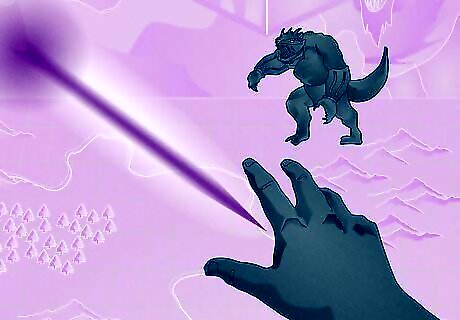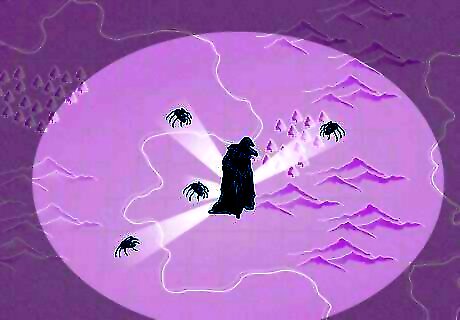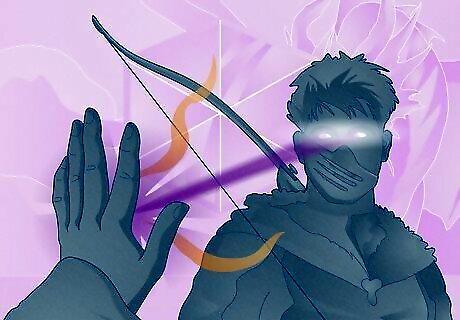
views
- The blinded condition means a PC is unable to see. As a result, blinded PCs fail any ability check relying on sight and make attack rolls with disadvantage.
- Additionally, attack rolls against blinded creatures have advantage, making them more likely to succeed.
- End the blinded condition with the Lesser Restoration spell. Alternatively, try to succeed on a Constitution saving throw (or simply wait for the effect to end).
What is the blinded condition in D&D 5e?

The blinded condition in D&D temporarily renders characters unable to see. According to the Basic Rules of D&D 5e, a blinded creature can’t see and fails any ability check that relies on sight. Furthermore, attack rolls against blinded creatures get advantage, while the blinded creature’s attack rolls must all be made with disadvantage. The blinded condition can easily change the outlook of a battle by rendering enemies (or your own player character) unable to see, making it more difficult for them to use certain tactics or abilities. In D&D, “advantage” means rolling a d20 twice and taking the higher roll, while “disadvantage” means rolling a d20 twice and taking the lower roll. Thus, a blinded creature with disadvantage is less likely to succeed on ability checks, while attacks against a blinded creature are likelier to hit.
Mechanics Affected by the Blinded Condition

Spellcasting Depending on the spell you cast, it can be more challenging for a PC (player character) to hit enemies with spells while blinded. When a PC can’t see their target, they have disadvantage on the spell attack. Similarly, it’s harder for PCs to hit groups of enemies with an area-of-effect spell when they don’t know exactly where to aim. Any spell with casting rules explicitly stating “a point you can see” becomes impossible to cast while blinded. Every spell has its own rules for casting, so be sure you read them over—especially if you’re about to try and cast a spell while your PC is blinded. For example, if you wanted to cast the Arcane Gate spell but your PC is blinded, you wouldn’t be able to because the spell’s description specifies you must “Choose 2 points on the ground you can see.” On the other hand, the Fireball spell requires you to indicate “a point you choose within range” while casting, so you don’t necessarily need to be able to see—although you may still end up missing your target or hitting allies while blinded.

Blind Fighting Trying to strike enemies with either a melee or ranged weapon while blind can be difficult because your PC has disadvantage on all attacks. However, “Blind Fighting” is a specific fighting style available in D&D 5e that allows PCs to effectively see anything within 10 feet that isn’t obscured by cover, even while they’re blinded. So, if your PC has Blind Fighting, they can ignore some of the adverse effects of the blinded condition. Fighting styles are primarily available to martial classes like fighters, paladins, and rangers. You won’t be able to get any fighting styles if your PC is a spellcaster (like a wizard or sorcerer). In D&D, “cover” is anything from walls to trees and other obstacles that provide shelter for creatures in combat, making it more difficult to target them. While a target has total cover, it can’t be sensed with Blind Fighting.

Blindsight Blindsight is a rare sensory ability in D&D 5e that allows a PC to ignore the effects of the blinded condition within a certain radius. Creatures with blindsight can perceive their surroundings without relying on sight (unless an enemy has total cover, as mentioned above). Not many PCs automatically get blindsight in 5e, but a few spells and class abilities let you do so, including: Draconic Transformation. A spell available to druids, sorcerers, and wizards, Draconic Transformation grants blindsight with a range of 30 feet (along with other draconic-themed perks). Ascendant Aspect. If you decide to play a monk PC with the Way of the Ascendant Dragon subclass, you’ll get an ability called Ascendant Aspect that grants blindsight. Blindsense. If you’re playing a rogue character, you’ll get an ability called blindsense, which isn’t quite the same as blindsight but still lets your PC hear hidden or invisible creatures within 10 feet. Feral Senses. This ranger ability doesn’t grant blindsight, but it does negate the effects of the blinded condition, letting ranger PCs ignore disadvantage while blinded and sense invisible creatures within 30 feet.
What causes the blinded condition?

Spells If you’re thinking about targeting an enemy with the blinded condition, consider using a spell to do it! Many D&D 5e spells can impose the blinded condition, usually by first forcing them to make a Constitution saving throw. Constitution is an ability score that measures a creature’s vitality and resilience—so when a creature’s resilience is compromised, and they fail a saving throw, they become blinded. Spells that can blind enemies include: Blinding Smite (paladin) Blindness/Deafness (bard, cleric, sorcerer, wizard) Color Spray (sorcerer, wizard) Contagion (cleric, druid) Divine Word (cleric) Holy Aura (cleric) Holy Weapon (cleric, paladin) Nathair’s Mischief (bard, sorcerer, wizard) Prismatic Spray (sorcerer, wizard) Pyrotechnics (artificer, bard, sorcerer, wizard) Reality Break (wizard) Sunbeam (druid, sorcerer, wizard) Sunburst (druid, sorcerer, wizard) Wall of Light (sorcerer, warlock, wizard) Wall of Sand (wizard)

Obscured vision Any heavily obscured area can block vision entirely. This includes areas saturated with magical darkness, opaque fog, or dense foliage—though creatures that don’t have darkvision can be blinded by normal darkness as well. While in an area that is heavily obscured, PCs are considered blinded, but the condition usually automatically ends once your PC leaves that area. Darkvision is a sense that lets creatures see in the dark (so long as that darkness isn’t magical and caused by the Darkness spell, for example). Many nonhuman races (elves, dwarves, tieflings, and more) naturally have darkvision. If your PC doesn’t have darkvision, it’s not the end of the world; they can get it using the Darkvision spell or use spells such as Light or Dancing Lights (both cantrips) to illuminate an area.

Feats Feats are additional abilities and skills that you can give your PC periodically upon leveling up. While not many feats directly let PCs inflict the blinded condition on other creatures, a few feats grant PCs access to blindness-inflicting spells. Consider the following feats for a PC if you’re looking to trigger the blindness condition on the battlefield: Abberant Dragonmark. This feat lets your PC learn the Color Spray spell from the sorcerer spell list, which includes an effect that can blind foes. Magic Initiate. The Magic Initiate feat lets your PC learn a spell from either the sorcerer or wizard spell list, including potentially Color Spray. Shadow-Touched. This feat will also grant your PC access to the Color Spray spell (in addition to other perks). Svirfneblin Magic. This feat with specific to svirfneblin (deep gnome) PCs and lets them pick up the Blindness/Deafness spell.

Monsters If you’re a DM (Dungeon Master) and interested in imposing a few challenges for your players in combat (including potentially giving them the blinded condition), there are several monsters with spells or abilities that could do the trick. You could always homebrew a spellcaster enemy with any of the spells mentioned above prepared (like an archmage with Prismatic Spray) to blind PCs or choose a monster such as: Cloakers. Cloakers are insidious monsters that drop down onto surprised adventurers, latching onto their heads to blind and suffocate them. Shambling Mounds. Shambling Mounds can grapple their foes and envelop them in a mass of vines, which causes blindness (among other conditions). Any creatures with the Swallow ability. If a monster can potentially swallow the PCs, it can blind them—because any creature stuck in a monster’s gullet gets blinded. Such creatures include the Purple Worm, Behir, and Remorhaz.
How to Get Rid of the Blinded Condition

Casting Lesser Restoration Lesser Restoration is a level 2 abjuration spell available to bards, clerics, druids, paladins, and rangers. The spell can end a single disease or condition affecting a creature—namely, the blinded, deafened, paralyzed, or poisoned conditions. Thus, if your PC gets blinded and they or any of the party members have Lesser Restoration on hand, this spell can be a quick fix (particularly in battle). Higher-level spells that can cure blindness include Heal, which is a level 6 spell available to clerics and druids, and Mass Heal, which is a level 9 spell available only to clerics.

Making Constitution saving throws If your PC falls victim to an effect or spell that causes blindness, the good news is that many effects involve making Constitution saving throws to try and end the condition. Thus, you’ll have the chance to end the condition prematurely. Wait for the DM to ask you for a Constitution saving throw—and if your PC succeeds, they’ll be able to see again. Having a high Constitution modifier (or having a high Constitution ability score) increases your chances of success when making saving throws. An ability like Baric Inspiration or a spell such as Bless can give you a bonus to your saving throws—and with a higher saving throw bonus, you also have a higher chance of success.

Letting the condition wear off Even if your PC gets afflicted with the blinded condition and can’t seem to shake it with a Constitution saving throw, a surefire way to end the condition is simply to wait it out. Generally, conditions are temporary in D&D 5e; they wear off after a few rounds, minutes, or hours at most. Blindness can also be caused by having your PC close their eyes or blindfold themselves—so, on the off-chance that their blindness is self-inflicted, simply have your PC open their eyes again!



















Comments
0 comment